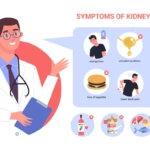Few foods have earned the title of “nature’s multivitamin” quite like the egg. Packed with high-quality protein, essential vitamins, and healthy fats, eggs are among the most nutrient-dense foods available. Whether scrambled, boiled, poached, or sunny-side-up, eggs are a staple in diets across the world — and for good reason.
In this article, we explore 7 science-backed reasons why you should eat eggs daily, debunk common myths about cholesterol, and reveal how this simple superfood supports your overall well-being.
Table of Contents
1. Eggs Are a Complete Source of High-Quality Protein
The Building Block of Life
Eggs are one of the best natural sources of complete protein, containing all nine essential amino acids required for muscle growth and repair. One large egg provides about 6–7 grams of protein with only around 70 calories — a perfect ratio for anyone seeking lean muscle, weight management, or better recovery after workouts.
Why Protein Matters
Builds muscle mass and strength.
Boosts metabolism, helping you burn more calories.
Repairs body tissues and supports immune function.
Keeps you fuller for longer, reducing unhealthy snacking.
Scientific Insight:
Studies have shown that individuals who include protein-rich foods like eggs in their breakfast feel more satiated throughout the day and consume fewer calories later on.
Tip: Combine eggs with vegetables or whole grains for a balanced, protein-rich meal that fuels your body all day.
2. Eggs Are Nutrient-Dense and Low in Calories
A Multivitamin in a Shell
One egg contains a powerhouse of essential nutrients, many of which are difficult to get in sufficient amounts from other foods. Despite being calorie-light, eggs are loaded with:
| Nutrient | Function |
|---|---|
| Vitamin A | Supports eye and skin health |
| Vitamin D | Aids calcium absorption and bone strength |
| Vitamin E | Acts as an antioxidant |
| Vitamin B12 | Maintains nerve and brain function |
| Folate | Crucial for red blood cell production |
| Selenium | Boosts immunity |
| Choline | Essential for brain and liver health |
Eggs also contain small amounts of iron, calcium, zinc, and phosphorus — making them a perfect example of how nutrient density doesn’t require high calories.
Calorie Comparison:
1 large egg = ~70 calories
1 banana = ~90 calories
1 slice of white bread = ~80 calories
You get more nutrients per calorie with eggs than almost any other common food.
3. Eggs Promote Brain Health and Cognitive Function
The Choline Advantage
Choline is a lesser-known but vital nutrient — and eggs are one of the richest natural sources. One large egg provides about 30% of your daily choline requirement.
Why Choline Is Important:
Builds cell membranes and neurotransmitters.
Enhances memory and learning capacity.
Supports fetal brain development during pregnancy.
Prevents age-related cognitive decline.
Fun Fact: Studies link adequate choline intake to improved brain development in infants and better memory in adults.
Omega-3 Enrichment
Omega-3 enriched eggs (from hens fed with flaxseeds or algae) offer added benefits, helping reduce inflammation and supporting brain and heart health.
Tip: Choose pasture-raised or omega-3 enriched eggs for maximum cognitive and cardiovascular benefits.
4. Eggs Support Eye Health and Vision
Nature’s Protection for Your Eyes
Egg yolks are rich in two powerful antioxidants: lutein and zeaxanthin. These carotenoids protect the eyes from blue light damage, reduce the risk of macular degeneration, and prevent cataracts — leading causes of vision loss with aging.
How It Works:
Lutein and zeaxanthin accumulate in the retina, acting as natural sunblock.
Vitamin A in eggs prevents night blindness.
Scientific Evidence:
A study published in the American Journal of Clinical Nutrition found that individuals consuming eggs regularly had significantly higher lutein and zeaxanthin levels, improving eye protection.
Pro Tip:
Eat the yolk, not just the white! Most of the antioxidants and nutrients for eye health are found in the yolk.
5. Eggs Help With Weight Management
Stay Full, Eat Less, Lose Weight
If you’re aiming to lose or maintain weight, eggs should be your go-to breakfast food. Their high protein and healthy fat content keeps you full longer, preventing overeating later in the day.
Scientific Findings:
A study from the International Journal of Obesity showed that people who ate eggs for breakfast consumed up to 400 fewer calories per day than those who ate bagels.
Protein boosts thermogenesis, meaning your body burns more calories digesting it compared to carbs or fats.
Best Way to Eat Eggs for Weight Loss:
Boiled or poached (no oil required)
Combined with vegetables for fiber
Avoid fried eggs or heavy sauces
Example:
A breakfast of two boiled eggs with spinach and whole-grain toast offers a perfect balance of protein, fiber, and slow-digesting carbs to energize you all morning.
6. Eggs Strengthen Heart Health (When Eaten Moderately)
The Cholesterol Myth – Debunked
For years, eggs were unfairly blamed for increasing cholesterol and causing heart disease. However, modern research has shown that dietary cholesterol (like that in eggs) has minimal impact on blood cholesterol for most people.
What the Science Says:
Eating one egg a day does not increase heart disease risk in healthy individuals.
Eggs raise HDL (good cholesterol), which helps remove LDL (bad cholesterol) from the bloodstream.
The balance between HDL and LDL improves overall heart health.
Eggs and Triglycerides
Omega-3 enriched eggs also help reduce triglyceride levels, further supporting cardiovascular health.
Tip: Pair eggs with vegetables, avocado, or whole grains — not with processed meats like bacon — to keep your meal heart-healthy.
7. Eggs Strengthen Immunity and Support Healthy Skin & Hair
Immunity Boosters in Every Bite
Eggs contain essential vitamins like Vitamin D, A, and E, which play crucial roles in strengthening the immune system.
Vitamin D supports immune cell function.
Selenium acts as an antioxidant, protecting against infections and inflammation.
Zinc aids in wound healing and immune defense.
Skin and Hair Benefits
Eggs are rich in biotin, sulfur, and amino acids, all vital for maintaining healthy skin, strong nails, and shiny hair.
Regular consumption of eggs can:
Improve hair texture and strength.
Support collagen production for youthful skin.
Reduce dry or brittle nails.
DIY Beauty Tip:
Egg whites can also be used in natural face masks for tightening pores and brightening skin tone.
Additional Benefits of Eating Eggs Daily
While the above are the main reasons, there are several other benefits worth noting:
Support Bone Health: Vitamin D and phosphorus in eggs strengthen bones and teeth.
Improve Metabolism: Protein and B vitamins keep energy levels stable.
Boost Fertility: Choline and healthy fats support reproductive health.
Enhance Mood: Eggs promote serotonin production, improving emotional well-being.
Improve Liver Function: Choline prevents fat buildup in the liver.
Best Ways to Eat Eggs Daily
Healthy Cooking Methods:
Boiled: Retains most nutrients without added fat.
Poached: Gentle cooking preserves delicate proteins.
Scrambled (with olive oil): Add veggies for fiber and antioxidants.
Omelette: Combine with spinach, mushrooms, or tomatoes.
Egg salad: Mix with avocado instead of mayonnaise.
Avoid:
Deep frying in butter or oil.
Combining with processed meats.
Over-salting or using high-fat sauces.
Pro Tip:
Eat both the white and yolk — together, they deliver the complete nutrition package.
How Many Eggs Should You Eat Daily?
For most healthy individuals:
1–2 eggs per day are perfectly safe.
Active people or athletes can eat up to 3 whole eggs daily, depending on total calorie needs.
People with high cholesterol should consult a doctor but can often safely consume eggs in moderation.
Eggs for Different Age Groups
| Group | Recommended Eggs per Day |
|---|---|
| Children | 1 egg daily |
| Adults | 1–2 eggs daily |
| Athletes | Up to 3 eggs daily |
| Seniors | 1 egg daily for protein and bone health |
Debunking Common Myths About Eggs
| Myth | Truth |
|---|---|
| Eggs increase cholesterol | Moderate consumption is safe; they raise HDL (good) cholesterol |
| Only egg whites are healthy | Yolks contain most of the vitamins and antioxidants |
| Eating eggs daily causes weight gain | Eggs aid weight management when part of a balanced diet |
| Raw eggs are healthier | Cooking enhances nutrient absorption and kills bacteria |
| Brown eggs are more nutritious | Color difference comes from hen breed — nutrition is nearly the same |
Precautions and Who Should Limit Eggs
While eggs are safe for most, certain individuals should take precautions:
People with advanced diabetes or heart disease should moderate intake.
Avoid raw or undercooked eggs to prevent Salmonella infection.
If allergic, seek alternatives like tofu or legumes for protein.
Conclusion
Eggs truly are one of nature’s most complete and affordable superfoods. From supporting muscle growth and brain function to boosting immunity and heart health, the benefits of eating eggs daily are undeniable.
When prepared healthily and eaten in moderation, eggs can become a cornerstone of a balanced diet — helping you live stronger, sharper, and healthier every day.
So, the next time you crack an egg, remember: you’re cracking open a world of nutrition.
FAQs: 7 Reasons to Eat Eggs Daily
1. Is it safe to eat eggs every day?
Yes, for most healthy people, 1–2 eggs daily are safe and beneficial. They do not increase heart disease risk when part of a balanced diet.
2. Do eggs cause high cholesterol?
No. Dietary cholesterol from eggs has minimal effect on blood cholesterol in most individuals.
3. What is the best time to eat eggs?
Morning or post-workout is ideal for maximum protein absorption and energy boost.
4. Are boiled eggs healthier than fried eggs?
Yes. Boiled or poached eggs retain nutrients and avoid added fats, making them healthier options.
5. Can eggs help in weight loss?
Absolutely! High protein keeps you fuller for longer and boosts metabolism.
6. Should I eat the yolk or only the white?
Eat both. The yolk contains vital nutrients like vitamin D, B12, choline, and antioxidants.
7. Which eggs are the healthiest?
Pasture-raised or omega-3 enriched eggs provide superior nutrition and better fatty acid balance.
8. Are eggs good for pregnant women?
Yes, eggs are rich in choline and folate, supporting fetal brain development — just ensure they’re fully cooked.
9. How long do eggs stay fresh?
Fresh eggs last up to 3–5 weeks in the refrigerator.
10. Can I eat eggs at night?
Yes, eggs at dinner can aid muscle recovery and keep you full overnight.












